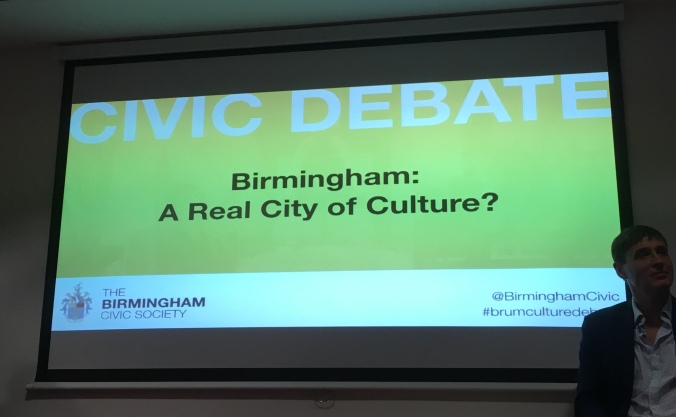
Last night I went along to a ‘debate’ called Birmingham: A Real City of Culture? organised by the Birmingham Civic Society. That hesitant question mark says a lot about a city in which political, economic, and cultural leadership feel hesitancy or ambivalence towards that which they purport to represent.
I was unsure as to whether this blog post ought to be in my regular political blog, or my rarer forays into the blogosphere as a writer, and therefore also as cultural critic. But most of my few posts here have tended to be about my city in some way, from Charlie Hill reflecting on place in his fiction, to praising the contribution of Waterstones’ dynamic regional manager, Stuart Bartholomew, to our literary culture. Civic identity and culture are indivisible.
And so to the ‘debate’, upstairs in a meeting room at The Rep. All the invited speakers, several of whom I have heard before, made intelligent and reasoned contributions, very much couched in the reality of our bean-counting, Gradgrindish times.
Part of the underlying anxiety was about money, and certainly for the larger cultural institutions in the city, money is the number one, urgent, unavoidable problem. But in a sense, the money problem is identifiable, quantifiable, and to some extent open to strategies of amelioration. But the bigger issue, touched on in various ways by all the speakers, was one of their legitimacy, and of the wider city’s apparent estrangement from the efforts of arts institutions to reach out to the youngest, most diverse city in Europe.
That’s what set me thinking about my own experiences. My parents were immigrants; working class migrant workers without the sort of cultural capital that might make them look to the theatres, galleries, concert halls of their new home. Yet their children became avid consumers of, and contributors to, our wider culture in ways which cultural leaders would surely recognise as almost stereotypically middle class. So how did it happen for us, but not for so many others?
One part of the answer is surely to do with the temperaments of individuals, and the mores of the times. Look at the architecture of Birmingham’s old municipal cultural and leisure heritage. In many High Streets, municipal baths and libraries occupy the same footprint. The baths, back in the mid-20th Century, were still used for their original purpose – not just swimming, but as wash-houses for a population still living in homes without bathrooms. People had, of necessity, to use the municipal baths, and this surely led to use of the libraries?
I grew up at a time when Sundays were quiet, family times. With no shopping malls open on a Sunday, we used the local parks for family outings, or went to places that were open, and free. A regular destination for our family was the Museum and Art Gallery. This was my father’s choice. As a small child I remember walking up the stairs, being intrigued by the picture of the Edwardian ladies on Corporation Street, and then turning to grab my Dad’s hand, and screw up my eyes tight as we edged past the terrifying Epstein Lucifer. We didn’t linger over the Pre-Raphaelites, or even wonder at the Egyptian gallery – we made a bee line for the reason for our visit: Victorian taxidermy! For we were drawn to the museum to get close-up and personal to a stuffed tiger in a glass cage! Quite a treat, I’d imagine, for someone who’d grown up in Bengal.
I didn’t much like the stuffed animals, but I did like the museum, and returned regularly, on my own when I got older. My primary school trip to The Rep started another habit. And we must mention television. I grew up in a city with a skyline that was familiar to the whole nation. Both the BBC and ITV had major production facilities in the city, and made popular drama with a local accent. Why this was stolen from us, I do not understand.
Above all, though, it was my library card that was transformative.
There are still immigrants trailing small children around the museums and galleries of the city, though mostly my impression is that they are white Europeans. But give people reasons to go, with free-access, and start them young, and barriers can be broken down.
But above all, it is the libraries – unmentioned last night – which are the first, crucial step to wider cultural engagement. I use the libraries still. It is highly educational. The libraries are crowded with young, diverse people. The highest use of the libraries comes from wards in the city with the greatest diversity and the lowest income levels. Investment in IT has been crucial, providing access to online services to people who would otherwise be excluded. I’ve seen people clearly buying stock for small businesses in the public library, and why not? Above all, in the library, men and women, boys and girls, mingle, make friends, talk to one another, break down barriers, and thereby make the city’s future happen.
Gary Topp of Culture Central is right, that institutional, top-down fixes are not a solution to our city’s problems, cultural, economic, political. He’s also right that in an era in which the centralised nation-state is a failing institution, especially for people’s identities, and sense of belonging, the city is emerging once again as a centre of power, innovation and hope. But for Birmingham to be a leader, not an also-ran, in that project, we need all of us in the city to be telling our own stories in our own ways, and for cultural institutions to do their bit in nurturing and showcasing what emerges.
As Stuart Hall once said, whilst he was at Birmingham University’s Centre for Contemporary Cultural Studies – “A state of emergency is a state of emergence”.